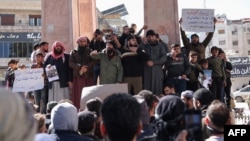Protests have continued in a northwestern Syrian enclave, a sign seen by analysts as a rare sign of defiance of a powerful jihadist group.
For several days, hundreds of people have protested in Idlib province where Hayat Tahrir al-Sham (HTS) is considered the most powerful group.
HTS, formerly known as al-Nusra Front, controls most of Idlib and small parts of neighboring provinces. The enclave is one of the few areas outside the control of Syrian government forces.
A local journalist who requested anonymity told VOA that since the beginning of March, protests have erupted in at least 20 locations in Idlib.
Protesters chant slogans against HTS leader Abu Mohamed al-Jolani, demanding the release of prisoners held by the extremist group and an end to its security grip on the enclave.
Designated as a terrorist organization by the United States, the HTS was the main affiliate of al-Qaida in Syria until 2018 when it formally severed ties with the global terror group. Experts, however, say the militant group has maintained its al-Qaida-inspired ideology.
Bassam Alahmad, executive director of Syrians for Truth and Justice (STJ), said the HTS “has been trying to impose its radical ideology on the local population.”
STJ, a Paris-based advocacy group focused on Syria, says it has documented numerous abuses by HTS members against civilians.
“In addition to constant arbitrary arrests carried out by HTS, there have been many cases of torture and even torture murders,” Alahmad told VOA.
The Syrian Network for Human Rights says at least 500 civilians were killed by the radical group between 2012 and 2021. More than 2,300 people remain either arbitrarily detained or forcibly disappeared by HTS, the rights group says.
Idlib is home to nearly 3 million people, a large percentage of whom are displaced from other parts of Syria that have been recaptured by forces loyal to the government of Syrian President Bashar Assad.
Internal discord
Over the years, the HTS has managed to eliminate most of its rival extremist factions and other antigovernment rebel groups. But in recent months, the jihadist group has been struggling with tensions among its top leadership.
In a recent move, al-Jolani jailed his top aide, Abu Maria al-Qahtani, accusing him of collaborating with "external" forces, in reference to the Syrian government and its allies. Other influential figures have also been removed from leadership positions by al-Jolani.
Some experts say such moves by al-Jolani have caused further friction within the HTS ranks, leading some members to join the anti-Jolani protest movement.
"It is very clear now that the HTS has been divided into several wings, some of which could be aligned with outside forces," said Ahmed Rahal, a former Syrian military general who defected from the army in 2012.
Rahal said in a recent video posted on social media that some wings within the HTS that oppose al-Jolani see the protests in Idlib as an opportunity to undermine the jihadist leader.
“Judging by his recent desperate moves, al-Jolani seems to be on the weaker side,” he said.
Syrian analyst Wael Olwan, who works with the Istanbul-based Jusoor Center for Studies, says al-Jolani and his allies have limited options at this point.
“He might have to either contain the internal divisions with the HTS or focus on containing the protests instead of confronting them,” he told the U.S.-funded Alhurra news channel. Both cases, Olwan said, show a sign of weakness within the HTS.
“The highly centralized structure that HTS once enjoyed no longer exists, whether for the control of Idlib or for its relations with other military factions," he said.
This story originated in VOA’s Kurdish Service.




